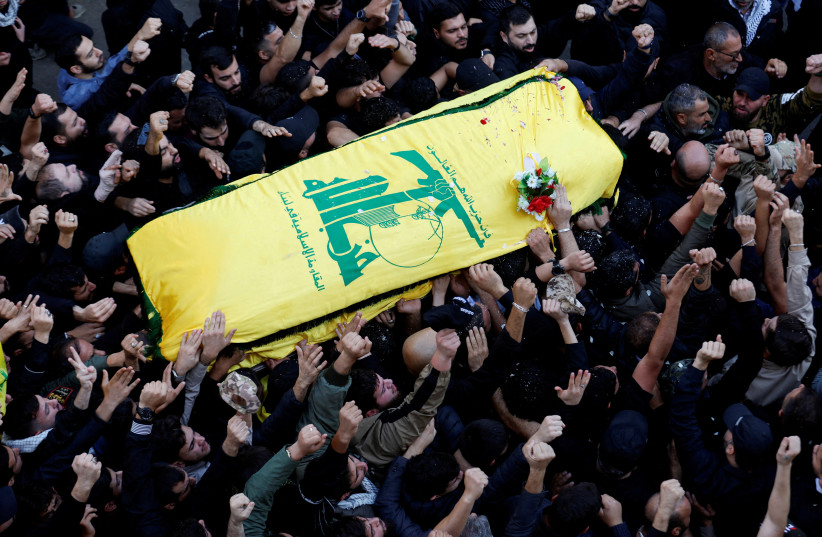As tensions continue to grow on the Israel-Lebanon border, international efforts to reach a diplomatic solution are intensifying. However, given the complexities of Lebanon’s current political situation, a diplomatic solution in which Hezbollah withdraws to north of the Litani River is not easily achievable despite vows of cooperation from Lebanese leadership.
For more stories from The Media Line go to themedialine.org
Since the Israel-Hamas war started on October 7, Hezbollah has fired rockets into northern Israel daily. The Iranian proxy’s group leader, Hassan Nasrallah, has declared that the attacks are done to help “their brothers in Gaza.” Israel has retaliated and killed over 150 Hezbollah operatives. The tension has been sustained at almost the same level for three months and has not yet escalated into an all-out war.
However, dozens of towns in northern Israel have been evacuated, and their residents are still internally displaced. According to Israel’s assessment, to be safe enough for Israelis to return to their homes, Hezbollah must retire to north of the Litani River, otherwise, there is still a possibility of war erupting.
Meeting with Lebanese officials
Before US Secretary of State Antony Blinken visited the region, Amos Hochstein, President Biden’s special envoy who mediated the negotiations for Israel and Lebanon’s maritime border denomination, met last Wednesday with Lebanon’s caretaker Foreign Minister Abdallah Bou Habib before arriving in Israel on Thursday. Once in Israel, Hochstein met with several officials in the Israeli leadership in a bid to set the ground for negotiations to avoid an all-out conflict between Israel and Hezbollah.
According to Ynet, a senior Israeli security official said, “Israel extends its hand for a diplomatic solution, emphasizing that it does not play games. However, any arrangement must include the removal of Hezbollah forces from the border to a distance that prevents immediate threats to northern settlements.”

As part of the possible negotiations, a new terrestrial border demarcation could be discussed as there are still areas along the northern border that both countries claim.
“We are looking at ways—diplomatically—to try and defuse that tension so that people can return to their homes; so they can live in peace and security. This is something that we are actively working on,” said Blinken after he visited Turkey as part of his Middle East tour.
Blinken also noted that an all-out war is not in Lebanon’s interest and whether it happens is in Hezbollah’s hands. “The question is in large part Hezbollah and what actions it will take,” he added.
Foreign Minister Habib said during a press conference last week that a diplomatic solution is viewed with positive eyes by the Lebanese government. “Diplomatic channels have to be open to signal that the war is not the only option, is the worst option, and to keep working on a diplomatic solution,” he said. He also stressed that Lebanon is committed to de-escalating the situation. However, he added that “the only political solution that will put an end to the conflict in the Middle East is to end the Palestinian conflict.”
The big question, however, is if a diplomatic solution with the Lebanese leadership would bind Hezbollah to retire to the north of the Litani River and avoid an escalation that would lead to a full-scale war. On the one hand, Hezbollah is part of the Lebanese parliament, so it participates in the country’s decision-making. On the other hand, and most importantly, the political situation in Lebanon has severely deteriorated, making a binding agreement more difficult to achieve.
First, the seat of the president has been vacant for over a year since Lebanon’s former president, Michel Aoun, finished his term in October 2022. The country’s parliament has failed to elect a successor after over a dozen parliamentary sessions for that end. Hezbollah’s parliamentarian representation has repeatedly sabotaged the process by casting white ballots and refusing to name a candidate.
The US State Department issued a statement on the vacancy’s year anniversary, urging the parliament to elect a president soon, and claiming that the parliament has failed to do so because the parliamentarians pursue personal interests instead of the country’s interests. “Even as rising tensions along Lebanon’s southern border threaten the country’s stability and the economic crisis deepens, the Lebanese people are deprived of leadership when they need it most,” the statement read.
In addition, Lebanon also lacks an elected government. The country is currently being ruled by a caretaker government headed by caretaker Prime Minister Najib Mikati. This temporary government has limited powers, too. However, the prerogatives of a caretaker government are subject to interpretation, and it is yet another issue of discussion among Lebanon’s parliamentarians.
Foreign Minister Habib said last week during an interview with CNN in Washington that the Lebanese leadership is trying to convince Hezbollah to retire and not engage in a full-scale war with Israel. However, no guarantee of achieving that aim was given by Habib, implying that it is not in the government’s authority to demand a withdrawal from Hezbollah. “It’s not like we can order them. We’re not claiming that, but we can convince them, and I think it is working in this direction,” he said.
